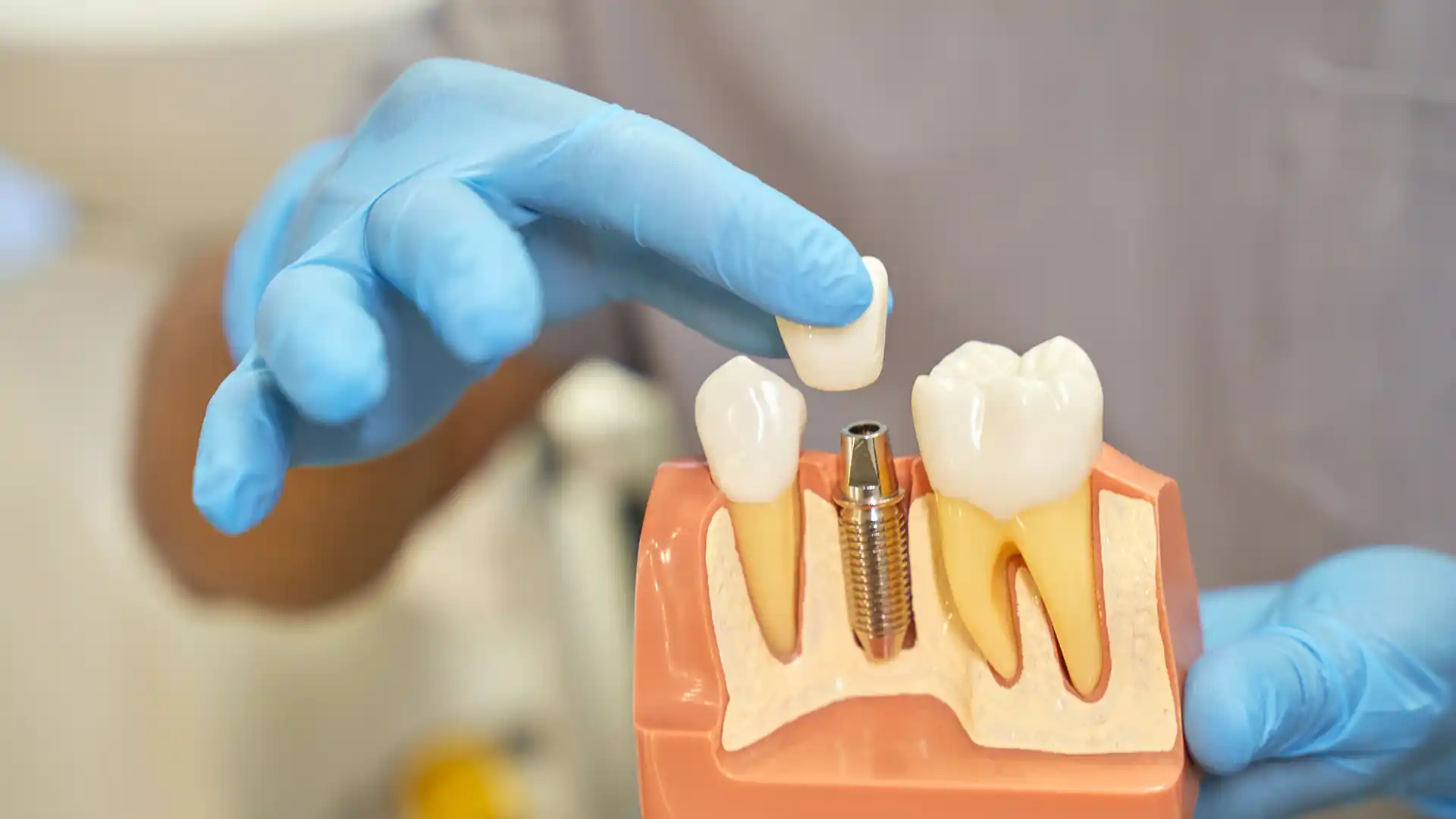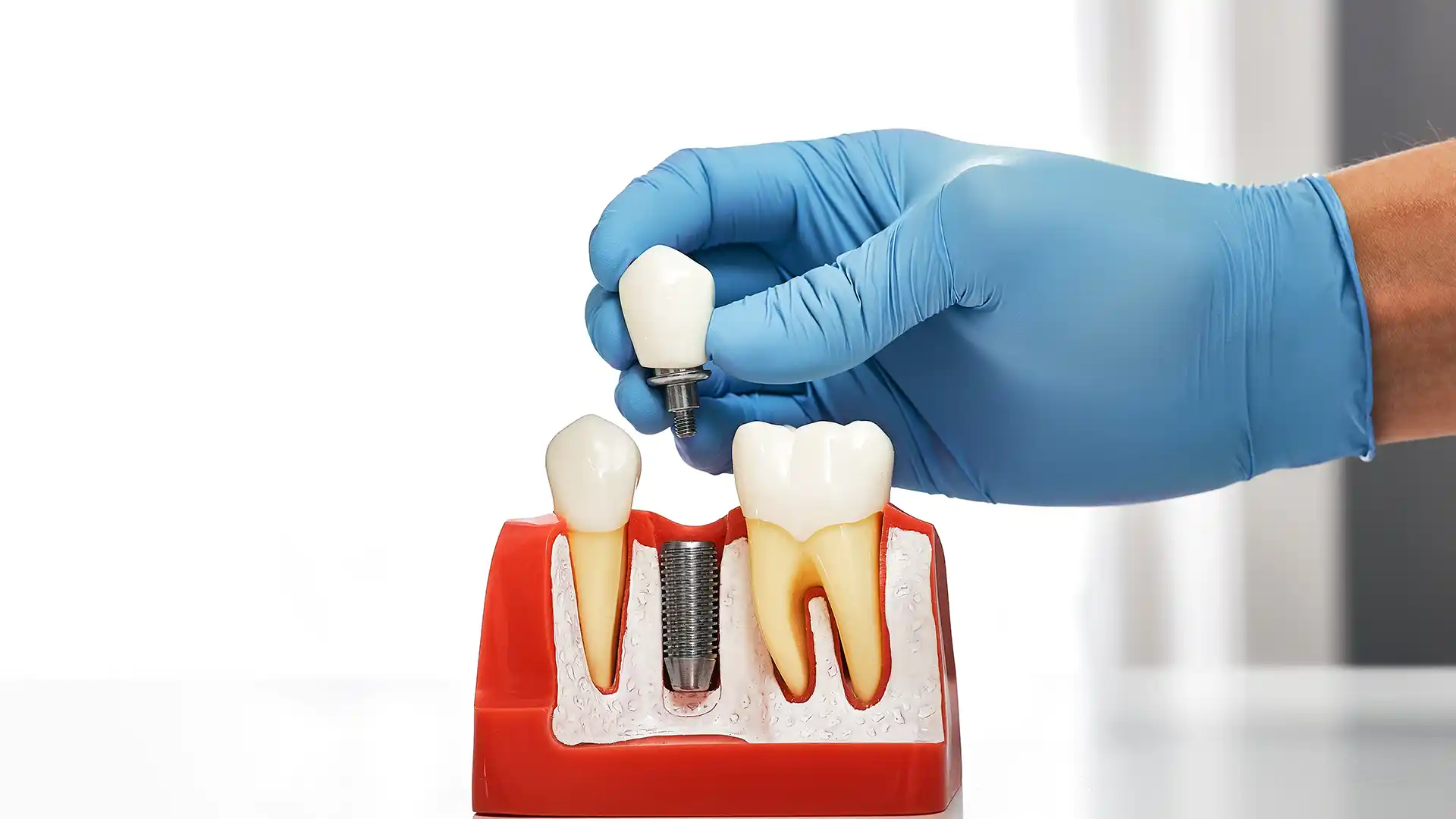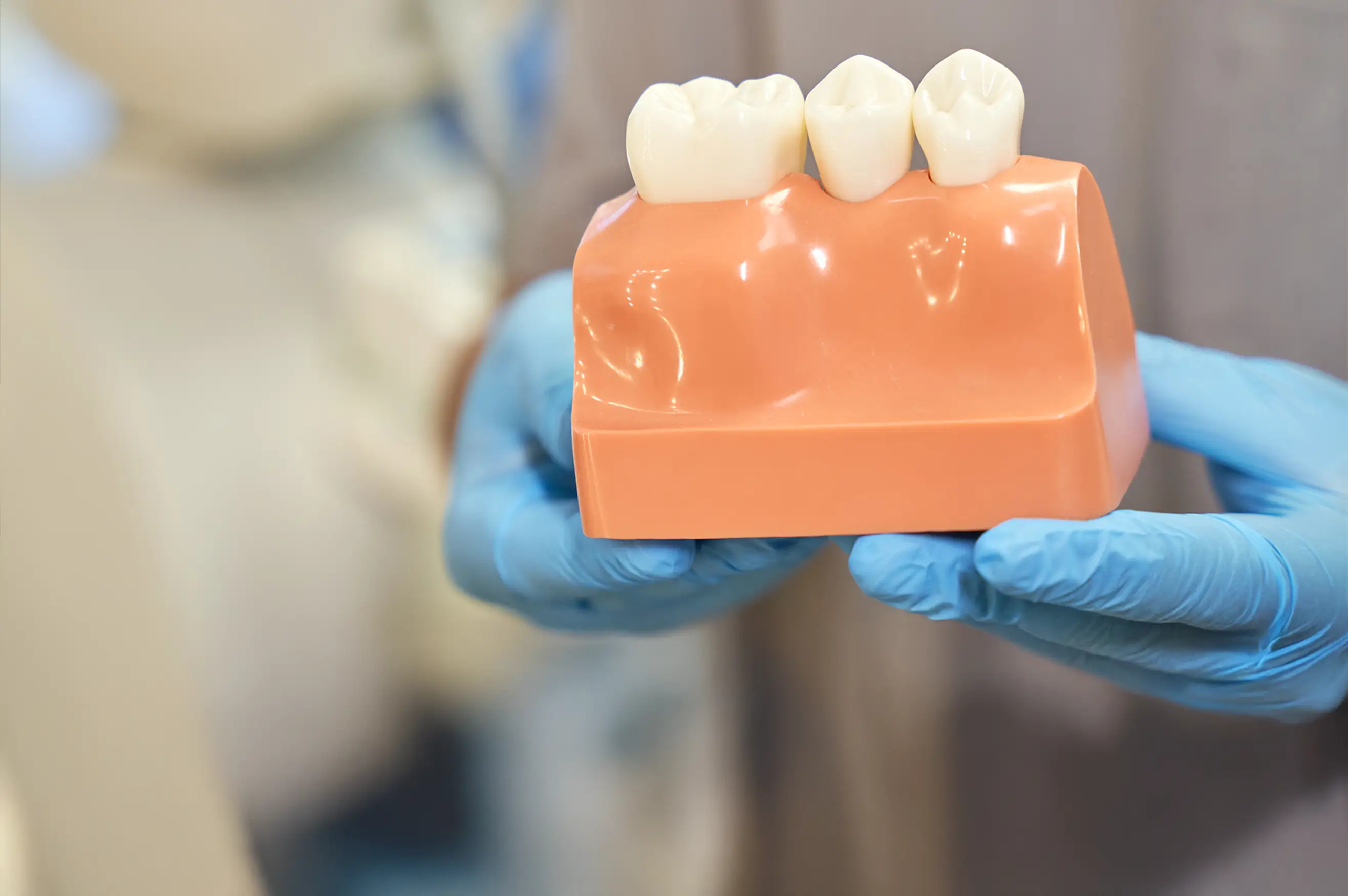Dental Crowns
Dental Crowns in Turkey 2025
Dental crowns in Turkey are caps shaped like teeth and they completely cover a tooth that has been damaged. They restore not only the strength but also the appearance and function of the tooth.
Table of contents:
- What are dental crowns?
- When do you need a dental crown procedure?
- What are the types of dental crowns used at Autora clinic in Turkey?
- How to prepare for dental crowns?
- How is dental crown procedure done?
- Dental crown recovery
- Dental crown aftercare
- Dental crowns benefits
- What are the Disadvantages of dental crowns on teeth?
- How much does the Full set of crowns cost in Turkey?
- Tooth crown before and after
What are dental crowns?
A dental crown — commonly known as a cap — is a tooth-shaped cover that fits over an injured tooth to restore its strength, shape and size. Normally crowns are advised for teeth that have lost much of their strength due to decay or fractures as it helps in getting back most functions with the original teeth.
When do you need a dental crown procedure?
A dental crown may be needed under the following circumstances:
-
A weakened tooth: Tooth strength can be compromised due to decay or fractures.
-
A tooth that is broken or worn down: Crowns help restore the shape and function of such teeth.
-
Large fillings: When a filling is too large, placing a crown can help protect what remains of the tooth structure.
-
Dental bridges: The bridge is anchored using crowns on adjacent teeth.
-
Discolored or misshapen teeth that affect your smile: Crowns can enhance your smile.
-
A dental implant: commonly a crown is placed over a dental implant to bring back function as well as appearance.
What are the types of dental crowns used at Autora clinic in Turkey?
Here are the most common crowns we used at Autora clinic in Istanbul:
-
Zirconium crowns
Strength and durability are the famous features of zirconia crowns. These make them an excellent choice not only for aesthetics but also for functionality. Zirconia crowns do not easily chip and are less likely to wear compared to porcelain; this unique property makes them appropriate for use on both anterior and posterior teeth.
Read More: Zirconia crown in Turkey : Advantages, Disadvantages and Cost
-
Porcelain Crowns
These are considered to be most beautiful visually as they mimic real teeth very well. They can be used on front teeth because of their ability to match natural color which doesn't harm other teeth appearance-wise. However, they might not last as long as other types of dental crowns.
-
Ceramic Crowns
Ceramic Crowns mimic the appearance of natural teeth like porcelain while
offering less strength— a middle ground between aesthetics and durability.
-
E-max crowns
E-max crowns are made from lithium disilicate ceramic. They achieve high marks in terms of both appearance and durability. With a reputation for their lifelike quality, they mimic the way light passes through actual teeth. The resilience of E-max crowns is equally notable— allowing them to be used on the front or back teeth, due to their strength. They also require less enamel removal than other types of crowns.

How to prepare for dental crowns?
In order to get optimal results, you should prepare for your oral health before dental crown procedure:
-
Treat existing dental problems like cavities or gum disease before you start the veneer process.
-
Keep your teeth clean by brushing it and using dental floss regularly.
-
Smoking is a behavior to avoid, since it could hamper the process of wound healing that in turn may negatively affect the result of veneer procedure. It's better not to smoke at least 24 hours before the start of the process.
-
Limit Alcohol Intake: Consuming alcohol can also thin your blood which means you might bleed more easily while having your anesthesia done during the procedure — this would also interfere with its working. Try not to drink alcohol a few days prior to your appointment.
-
When you're at the dentist, share medical history: Tell your dentist all about the medications you're taking, any allergies you have, and details of your current health conditions.
-
When you're at the dentist, share medical history: Tell your dentist all about the medications you're taking, any allergies you have, and details of your current health conditions.
How is dental crown procedure done?
Dental crown procedure step by step:
-
Your visit to the cosmetic dentist involves sharing your expectations, any concerns you hold, and your general oral health with the specialist.
-
Detailed examination including X-rays: The assessment covers your teeth, gums, and jawbone extensively. Besides these physical examinations, X-rays might be advised as part of further diagnostics to ascertain suitability for the treatments.
-
Procedure plan: Your dentist will create a treatment plan after your consultation and examination. This plan will specify the exact number of teeth that will receive crowns, the materials used for the crowns, as well as the chosen shades.
-
Crowns need substantial removal because they must cover the entire tooth structure — from top to bottom —
-
CAD/CAM advanced technology: The dentist employs a handheld wand-like instrument to capture digital images of the patient's teeth, generating a 3-D digital impression of your teeth.
-
Color matching is an important step in the fabrication of dental crowns.
-
When the dentist sends data to the dental laboratory and CAD software designs it based on specific details, later CAM technology is used to produce it from quality materials with precision.
-
Regarding temporary crown placement: it involves putting temporary crowns on your teeth temporarily as until the permanent ones are ready.
-
When the permanent crowns are delivered to the dentist's hands, the color and fit will be meticulously evaluated.
-
Securing the Crowns in Place: The final step involves permanently attaching the crowns onto the tooth structure using top-notch dental cement.
-
Ensuring Comfort and Proper Bite: Any necessary final adjustments will be made by the dentist to ensure comfort and a proper bite.
Read More: Hollywood smile makeover price in Turkey 2025
Dental crown recovery
The recovery after a dental crown procedure is generally easy. Most people can go back to their usual activities immediately and . However, it's not unusual to feel some minor discomfort for several days.
You may observe heightened sensitivity to hot or cold temperatures in the tooth that was treated. Typically this is mild and goes away within a week or two.
You may experience some soreness or redness around the gums, but don't worry, it will fade away in a few days.
If you feel uncomfortable with the pain, it may be useful to try over-the-counter pain relievers like acetaminophen or ibuprofen.
Dental crown aftercare
Ensuring the longevity of your dental crown entails proper aftercare. Here are some tips to keep that beautiful new smile sparkling:
-
Be Gentle While Brushing: Make sure you use a soft-bristled toothbrush and fluoride toothpaste to delicately clean your teeth and crown two times every day.
-
Flossing regularly would take away any plaque or food particles surrounding the crown which could be responsible for gum diseases.
-
Keep bacteria away with an antibacterial mouthwash; this will help in promoting oral health and stopping any bacteria that might have accumulated around the crown area.
-
Avoid foods that are excessively hard, sticky or chewy as they can harm your crown.
-
If you grind your teeth, consider using a mouthguard as a shield for your crown.
-
Keep up with regular dental appointments for cleanings and check-ups that allow surveillance of the crown's well-being.
Dental crowns benefits
The biggest benefit of a dental crown is to keep teeth in shape for a longer time. In particular, crowns can:
-
Deal with teeth that are worn or broken, or have decay
-
Defend teeth from erosion
-
Improve the process of chewing food
-
Make your look more attractive
-
Last for long years with care.
What are the Disadvantages of dental crowns on teeth?
Although dental crowns have several benefits for oral health, this procedure may involve some disadvantages:
-
Dentists do not advise crowns to individuals with unhealthy gum lines or those who grind their teeth.
-
Once you place the crown, you can't return the tooth to its previous situation. The process is irreversible, as it involves removing a part of the tooth enamel.
-
Teeth under crowns can decay over time, especially if they don’t fit properly.
-
A cracked or chipped crown cannot be repaired but only substituted.

How much does the Full set of crowns cost in Turkey?
Generally, the dental crown price in Turkey can range from $100 to $200, depending on the materials of the crown made of.
Have a look at the common types of dental crowns in Turkey:
|
Crown Type |
Price Range |
|
Ceramic crowns Turkey price |
$100 - $125 |
|
Zirconium crowns Turkey price |
$130 - $160 |
|
E-max crowns Turkey price |
$180 - $225 |
However, the full set of crowns cost in Turkey ranges between $2,000 - $3,000.
Full set of dental crowns Turkey prices comparison (USD & EUR)
|
Procedure |
Price Range (USD) |
Price Range (EUR) |
|
Dental Crowns Turkey price |
$2,000 - $3,000 |
€1,857 - €2,786 |
Read More: Types of dental crowns and cost in Turkey
Tooth crown before and after
Sources:
- https://www.webmd.com/oral-health/difference-between-veneers-and-crowns
- https://www.webmd.com/oral-health/what-is-a-zirconia-crown
- https://my.clevelandclinic.org/health/treatments/10923-dental-crowns
- https://www.healthline.com/find-care/articles/dentists/dental-crown
- https://www.webmd.com/oral-health/dental-crowns
- https://www.ncbi.nlm.nih.gov/pmc/articles/PMC3894084/
Got Questions? We’ve Got Answers
Explore the most asked questions and get quick solutions
Fill it out to get your free consultation
Innovation & Precision In Every Implant
We use only reputable, high-quality implants designed for long-term durability
BioTec Dental Implants


Hiossen Dental Implants


Straumann Dental Implants


Nobel Biocare Dental Implants


MegaGen Dental Implants








